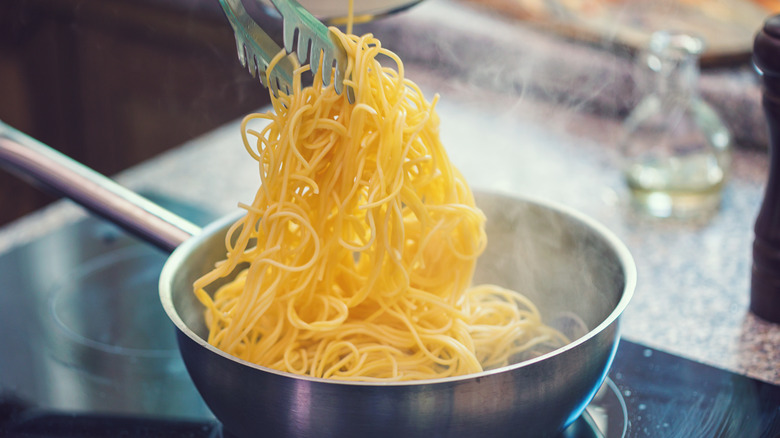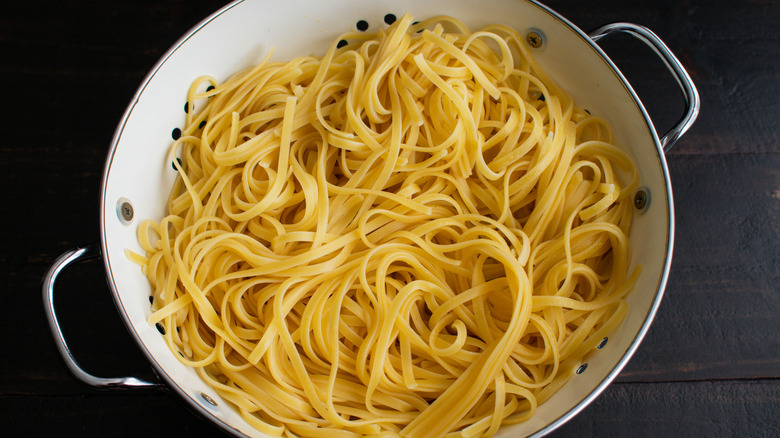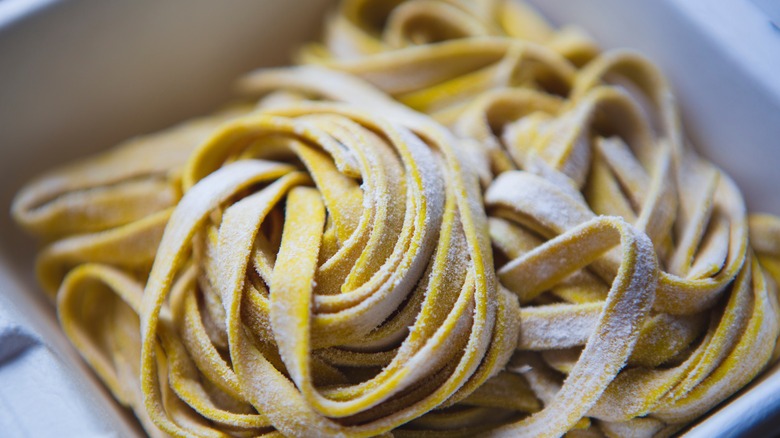Is It OK To Freeze Fully Cooked Pasta?
Dried pasta is a mainstay of the pantry, but truly time-starved cooks might wonder if there's a way to make it even more convenient. What if you could cook a lot of pasta in advance and store it to use any time you like, with no need to heat up a pot of water? Or maybe you've overestimated just how much pasta you need for a recipe, and end up cooking twice the amount. If you plan to consume your excess of noodles within the next few days, you'll likely turn to the refrigerator, but for a longer period of time, could you turn to the freezer?
The short answer is yes, it's completely okay to freeze plain pasta after it's been cooked. However, there are a few steps you must take to ensure you don't ruin the noodles. Proper freezing begins as soon as you boil the noodles: Make sure you cook your pasta al dente, meaning it's a bit firm instead of overly soft and floppy. If the pasta becomes too soft due to overcooking, it'll turn to slimy mush when you go to reheat it. Plus, you want to ensure the noodles don't stick together, which is fairly easy to achieve.
How to prepare cooked pasta for the freezer
Tossing cooked noodles with olive oil is one of the many handy hacks for making pasta. Whether you're letting it sit while you finish the sauce or plan to keep it in the fridge or freezer, the oil prevents the pasta from clumping into a single mass. Frozen pasta can be particularly prone to sticking together, especially longer, easy-to-tangle shapes like spaghetti and fettuccine, so don't skip out on this step.
After tossing them in oil, you can also create individual bundles of the long noodles and spread them out on a baking sheet to freeze, then consolidate all of them into one bag. This further prevents the pasta from freezing into a solid block. If you're freezing shorter kinds of pasta, like penne or rigatoni, just spread out the cooked pasta on a baking sheet, making sure each piece has its own space to avoid sticking.
Long, medium, and short-length pastas alike need only about one hour to freeze, but give the noodles a poke to make sure they're fully frozen before transferring them to single-serving bags and containers. Plain pasta can last for about eight months in the freezer before it starts to decline in quality.
Tips for thawing your frozen cooked pasta
As long as your pasta is prepared properly, you won't be dealing with unsightly mounds of icy frozen noodles, but rather separate servings that can be thawed individually. This means you can defrost only as much as you need at any given time. To thaw your noodles, you have a few solid options. You can slowly let the frozen pasta come up to temperature in the refrigerator, and then incorporate it into any recipe you'd like.
On the flip side, you may be tempted to drop plain pasta back into boiling water for quick thawing, but your haste could result in a mushy, overcooked texture. Remember, the pasta is already cooked, so it doesn't need much to bring it back to life after freezing. You can instead reheat it in warm water for a more gradual thawing that's still a bit quicker than the fridge. If you must, dunk the noodles in boiling water for only about a minute, and they should be ready for saucing. Now that you know how to freeze pasta properly, you can make an abundance of quick-ready pasta recipes even quicker.


